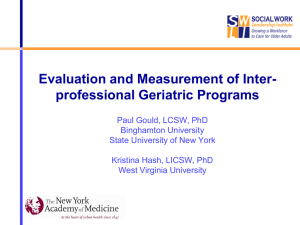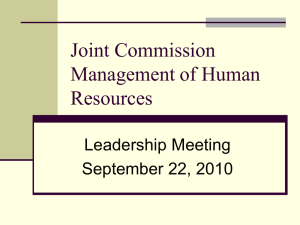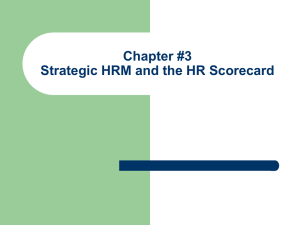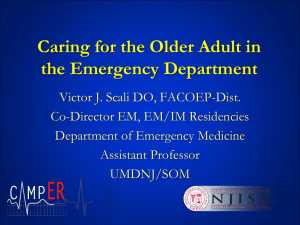PPT
advertisement
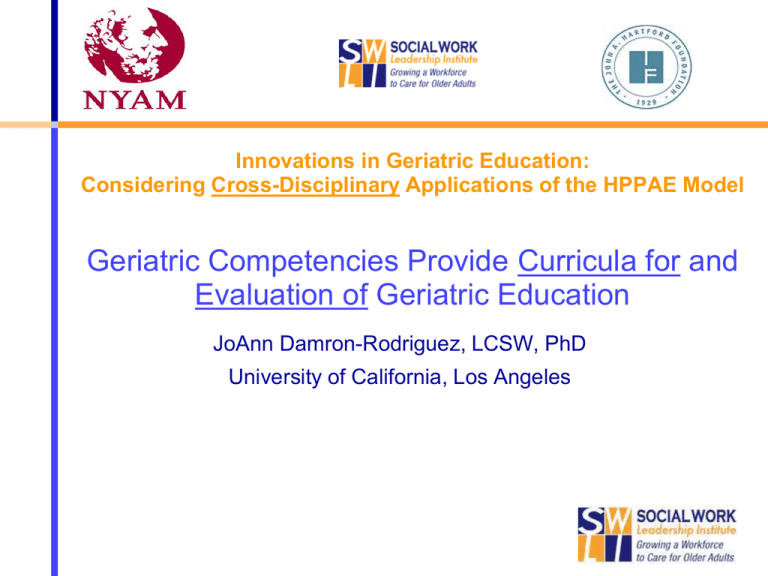
Innovations in Geriatric Education: Considering Cross-Disciplinary Applications of the HPPAE Model Geriatric Competencies Provide Curricula for and Evaluation of Geriatric Education JoAnn Damron-Rodriguez, LCSW, PhD University of California, Los Angeles Mandate for Competence Council on Higher Education Accreditation (CHEA), oversees standards for 76 professions adopted a competency model for accreditation (National Center for Higher Education Management Systems, 2000) Growing necessity for Evidence-based Practice (EBP), Best Practices, Practice Guidelines Competence Based Education and Evaluation (CBE) is the educational equivalent of EBP Competency-Based Education and Evaluation (CBE) Definition of Competence Competence: The state of being adequately or well qualified… a specific range of knowledge, values and skills Geriatric Competence: Continuing programs in order to effectively prepare practitioners to address the need of older adults and their families Essential Elements CBE 1) Adoption of a defined set of specific skills (competencies) as a framework for education in a field of practice 2) Applying the competencies to individual student learning goals 2) Assessment of student skill level, at the beginning of training and upon completion, using the identified set of competencies (Bogo et al, 2004) National Incorporation of Gero Social Work Competencies I. Council on Social Work Education (CSWE) 2008 Educational Policy and Accreditation Standards (EPAS) a competency-based outcome approach to curriculum design a focus on student outcomes based in practice behaviors competencies are measurable practice behaviors II. Hartford Geriatric Social Work Initiative Task Force for Advanced Gero Practice (2009) Relating Gero Social Work Knowledge and Practice Behaviors to EPAS EXAMPLE CBE APPLICATION EPAS Competence: Apply critical thinking to inform and communicate professional judgments ACTIVITIES, ASSIGNMENTS, READINGS ADVANCED GERO PRACTICE BEHAVIORS Relate concepts and theories of aging to social work practice (e.g., cohorts, normal aging, and life course perspective). CLASS EXERCISES Multigenerational Issues in Caregiving ASSIGNMENTS/ MEASUREMENT* Perspectives on Older Adults and the Aging Family Safety Checklist/Home visit interview (page 7 of syllabus) Relating Gero Social Work Knowledge and Practice Behaviors to EPAS EVIDENCE BASED PRACTICE Toseland, R. W.; Blanchard, C. G.; Mccallon, P. (1995). A ProblemSolving Intervention for Caregivers of Cancer-Patients. Social Science & Medicine, 40:4, 517. Cross Disciplinary Geriatric Competencies Nursing American Association of Colleges of Nursing and the Institute for Geriatric Nursing Older Adults: Recommended Baccalaureate Competencies and Curricular Guidelines Geropsychiatric Nursing Competencies Adult/Gero Primary Care Nurse Practitioner Competencies Adult/Gero Nurse Practitioner Competencies http://www.aacn.nche.edu/Education/adultgerocomp.htm Medicine American Geriatric Society Geriatric Competencies for Medical Students Internal Medicine/Family Practice Residency Training Surgical and Related Medical Specialties http://www.americangeriatrics.ogr/health_care_professionals/education/curric ulum_guidelines COMPETENCY EDUCATION FRAMEWORK Dimension Application Level Generalist vs. Specialist Foundation vs. Advanced Discipline Specific Cross Disciplinary Interdisciplinary Domain Content Topic Context Process Medicine, Nursing, Social Work Multi-disciplines same skill set Skills for disciplines in relation to other disciplines Geriatrics/Gerontology i.e. Depression, Falls SNF, HCBS Specifically identified for a program vs. broadly consensus based Forms of Cross-Disciplinary Education for Practice and HPPAE Implications Multidisciplinary Interdisciplinary Transdiciplinary Common goals Individual efforts Discipline expertise Responsibility for group effort Requires skills in effective group integration Each member supports/enhances programs and activities Examples of Cross-Disciplinary Competencies SUPPORTING FAMILY CAREGIVERS American Journal of Nursing Gold Award for Special Supplement Nursing Assessment Assess family knowledge of skills necessary to deliver care to older adults Social Work Assess caregivers’ needs and level of stress Family Education Involve, educate, and, when appropriate, supervise family, friends, and assistive personnel in implementing best practices for older adults. Use educational strategies to provide older persons and their families with information for wellness and disease management. Damron-Rodriguez, J.A. (2008). Developing competence for nurses and social workers: evidence-based approaches to education. American Journal of Nursing, Vol. 108, No. 9, 40-46. Rationale and Need for Multidisciplinary Competency-based Professional Education Focus on skills needed in real-world practice Assess trainees’ skills to: Enhance learning Inform curriculum development Evaluate training effectiveness IOM recommendation: “All licensure, certification, and maintenance of certification for healthcare professionals should include demonstration of competence in the care of older adults…” Partnership for Health in Aging www.americangeriatrics.org/pha Consensus Based Geriatric Competencies A PHA Workgroup organized by the American Geriatric Society built from the geriatric competencies from social work, medicine and nursing Over 25 healthcare professional organizations endorsed the competencies The following 10 disciplines were represented: Six Multidisciplinary Domains & 23 Foundational Competencies 1. Health Promotion and Safety 2. Evaluation and Assessment 3. Care Planning and Coordination Across the Care Spectrum (including End-of-Life Care) 4. Interdisciplinary and Team Care 5. Caregiver Support 6. Healthcare Systems and Benefits Partnership for Health in Aging www.americangeriatrics.org/pha Adopting National consensus-based identification of competencies Prioritization of core skill set Infusion generalist practice and enrichment specialist practice Applying to Curricula and Pedagogy - To define learning objectives based on outcomes To structure student contracts identifying competencies Develop modules and teaching resources To train field instructors Assessing Outcomes - Classroom assignments Field Practice including instrumentation Substantive Cross Site Evaluation of HPPAE Total 67 Graduate Schools of Social Work Participated Baseline data included year in program, specialization, prior aging courses, prior work experience with older adults, practicum placement and demographic information Students took on-line survey at PRE, INTERIM, & POST HPPAE to assess: Knowledge (Knowledge of Aging for Social Work Quiz) Knowledge of Community-based Services for Older Adults GSW Competency Scale II Field Instructors also assessed their students’ competency PRE (Student INTERIM) & POST HPPAE Geriatric Social Work Competency Scale II Domains of geriatric social work with 10 skills in each I. Values, ethics and theoretical perspectives II. Assessment III. Intervention IV. Aging services, programs and policies V. Leadership in the Field of Aging Rating on 5-point Likert scale 0 ----------------- 1 ------------------ 2 ------------------ 3 ---------------- 4 Not skilled at all - Beginning skill - Moderate skill - Advanced skill - Expert skill “Cannot Assess” for Field Instructors Social Work Leadership Institute www.socialworkleadership.org Student Self-Assessment of Geriatric Competencies Field Instructor Rating of Student Competence 50 50 45 45 40 40 35 35 30 30 25 25 20 20 Pre-test Post-test 15 15 10 10 5 5 0 0 Values p<.001*** Assessment p<.001*** Intervention p<.05* Aging services p<.05* Values p<.001*** Assessment p<.001*** Intervention p<.001*** Aging services p<.001*** An Example of a Systems Level Use of the Hartford Social Work and Nursing Competencies Improving Education on Aging in California USDE Fund for the Improvement of Postsecondary Education (FIPSE) UCLA lead community college, California State University, and University of California collaboration SAGE partners in nursing, social work and gerontology programs assessed competencies Rated disciplinary program based on competencies How well it was addressed What classes supported/taught on the competency How students were assessed GeroNet www.geronet.ucla.edu UCLA SAGE Gerontology Competency Mapping Strategy Competency Rating Supported by Courses: CRITICAL Student evaluation methods utilized THINKING 5. Appreciate the contributions that aging persons make to each other, families and society. 2 SOC 440 (Soc of Aging) PSY 365 (Intro to Gero) FCS 543 (Intergenerational Caregiving) Papers, exams, service learning activities, presentations, projects 6. Identify and define/describe bio/psycho/social concepts and theories used to study aging. 2 SOC 440 (Soc of Aging) PSY 365 (Intro to Gero) HSCI 418OL (Health and Aging) Papers, exams, service learning activities, presentations, discussions 0 = Not skilled at all (no experience with this skill) 1 = Beginning skill (have to consciously work at this skill) 2 = GeroNet Moderate skillwww.geronet.ucla.edu (skill is becoming more integrated into practice) UCLA 3 = Advanced skill (skill is done with confidence and is an integral part of practice) 4 = Expert skill (completes skill with sufficient mastery to teach others) Competencies to Learner Outcomes Professional Competency Educational Program: Integration of Classroom and Field CBE Learning Objectives Learning Activities to Support Objectives Assessing Competency-based Learner Outcomes IOM Recommendation: Geriatric Interdisciplinary Practice Medical Cognitive Affective Social Support Environment Functional Status Economic Spirituality GRECC Demographics and Profiles GERIATRIC RESEARCH EDUCATION CLINICAL CENTERS (GRECC) AND CARE MANAGEMENT & SOCIAL WORK SERVICES PARTNER TO CREATE VA HPPAE MODEL VA IS AN EXAMPLE OF EBP IN HEALTHCARE BUILT ON INTERDISCIPLINARY TEAMS 22 Interacting Elements of HPPAE Model Potential Building Blocks for Cross Disciplinary Education 1.University-Community Partnerships 2. Competency-Driven Field Education 3. Integrated Field Education Across Multiple Programs, Populations and Interventions 4. Expanded Field Instructor Role 5. Focused Recruitment for Geriatric Social Work 6. Leadership Development in Geriatrics Social Work Leadership Institute www.socialworkleadership.org





